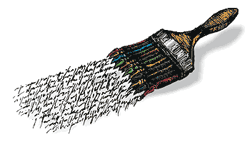 A football game is in progress. Players are fouling and not playing fair. At halftime, the referee changes the rules to allow offsides.
A football game is in progress. Players are fouling and not playing fair. At halftime, the referee changes the rules to allow offsides. That is how some political analysts characterise the present debate over constitutional reforms. The country's crisis represents a failure of politicians, they say, not the constitution.
But those in favour of reforms, and this group now includes the entire spectrum of parliamentary parties, want to tinker with the constitution-all for their own partisan interests.
The agenda for this debate is being set from behind the scenes by the Maoists and their violent attempt to dismantle parliamentary democracy. The Nepali Congress, UML, RPP and NSP all agree (and hope) that constitutional reforms will set everything right, and it may even bring the Maoists to the mainstream.
The Nepali Congress appears desperate enough to believe in its own panaceas. But it may not be as easy as that, and constitutional changes at this time may actually have unforeseen consequences. The debate over constitutional reforms is expected to heat up in the coming weeks, and may be little more than a way for non-performing parliamentary parties to divert attention from their own shortcomings.
At present all parliamentary parties and the palace are arrayed against the Maoists. The debate over constitutional change is sure to pit everyone against each other, and shatter this unity. But the pro-change juggernaut is now set to roll. Those like constitutional law expert Ganesh Raj Sharma who oppose tinkering, are becoming voices in the wilderness. "I still say, show some patience and discipline in the conduct of democracy, and things will fall into place," he told us.
Then there are those, including the Maoists, who say things have now got so bad that mere constitutional reform will not suffice. Former speaker and architect of the present constitution, Daman Nath Dhungana, is from this school. He says: "Every political party has its own agenda, how are they ever going to agree? I believe the answer may lie in a Constituent Assembly, there doesn't seem to be any other alternative to end the bloodshed."
The proposals for constitutional change of various political parties read like election manifestos. Many of the ideas do not need a change in the statutes to be implemented, new legislation would do. Here is a brief summary of the proposals the big parties have put up. The ruling Nepali Congress wants:
. Grant citizenship to all voters in the 1980 referendum
. Delineate more clearly the powers of the king
. Limit cabinet size to 25
. Slash lower house size to 155, and upper house to 35
. Public hearings to confirm appointment of Chief Justice
. Parliamentary hearings for confirming ambassadorships
. Prime minister to form 15-member election government
The main opposition UML, for its part, would like to have:
. An election government of all parties in parliament
. A national government in periods of crisis
. No more legal ambiguity over dissolution of parliament
. Limit cabinet size to 10 percent of parliament membership
. Give the CIAA more fangs
. Public hearings for appointments to all constitutional bodies
. More power to local government units
. Special programs for dalits, janajatis and women
. Education to respond to national need
. Confiscate property of corrupt
. Solve citizenship crisis without compromising national interest
The RPP and the NSP have their own lists which we will not go into here, except to say that the RPP wants members of the proposed election government not to contest elections, and local body elections to be on non-party basis. The tarai-based NSP's main plank is regional autonomy and a resolution of the citizenship problem. Oh yes, the NSP also want Hindi to be the national second language.
The only thing everyone seems to agree on is that the prime minister should have the power to seek a fresh mandate, and the formation of some kind of neutral election government. But agreeing and incorporating all the proposals, and keeping everyone happy would be long and acrimonious.
However pious the intentions for constitutional reforms are made to sound, almost every word in the party proposals smack of some vested, short-term partisan interest. The NC's proposals are devised in a manner that would increase its chances of remaining in power, and the UML's to provide it a stepping stone to enter Singha Darbar.


